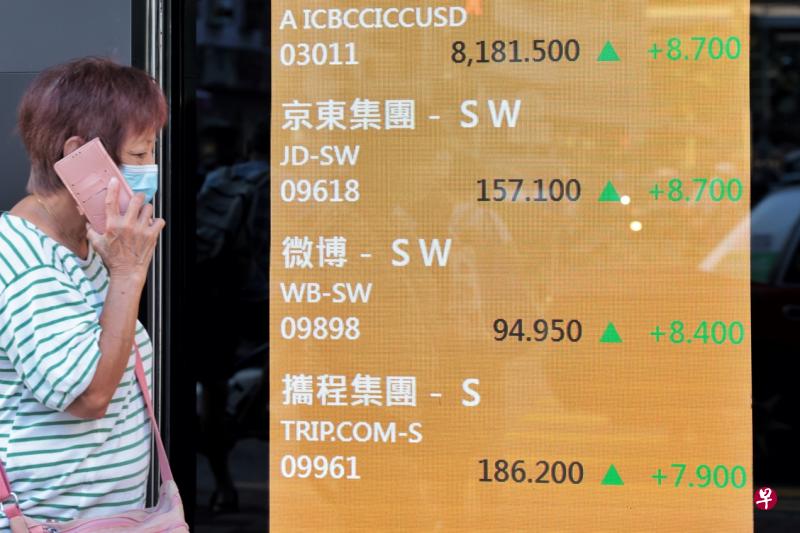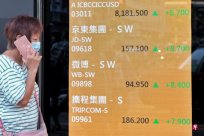
Although the relevant stock indexes have recovered one after another after the official voice, the investment institutions still have doubts about China's prospects.In view of the increase in uncertainties in future expectations, Morgan Stanley has significantly lowered the goals of the MSCI China Index under all situations, and expanded the point gap between the context of bull market and bear market.
After China's official voice appeases the market emotions, the relevant stock indexes that have plummeted this week have rebounded.The analysis believes that the market still needs time to digest the impact of the changes in the CCP's leadership, and it is expected that the stock market will continue to fluctuate in the short term.
Agreeing overnight Chinese stock markets, the Hong Kong stock market continued to rise yesterday
Chinese stocks listed in the United States have experienced the panic of Monday (October 24) after selling on Monday (October 24), and rebounded for two consecutive days.The NASDAQ Golden Dragon China Index, which reflects the performance of Chinese stocks, has raised 7.19 % on Wednesday (October 26), and has risen more than 12 % in two days, recovering most of this week.
Against the rise of Chinese stocks overnight, the Hong Kong stock market continued to rise on Thursday (October 27), and the Hang Seng Index closed up 0.72 % throughout the day.However, the Shanghai and Shenzhen 300 indexes on the mainland played 0.8 % on Wednesday and fell 0.7 % on Thursday, basically the increase of the day before.
On the first trading day after the Standing Committee of the Politburo of the Communist Party of China, the Lukang stock market and China stock markets were severely frustrated, and the RMB exchange rate also fell sharply.The Hang Seng Index set the biggest decline since the global financial crisis in 2008. The RMB exchange rate on the shore also fell to the lowest point in the past 15 years this week, highlighting the pessimistic expectations of the capital market for China's economic prospects.
The Bank of China, the China Banking Regulatory Commission, the Securities and Futures Commission, and the State Administration of Foreign Exchange co -spoke to appease the market on Wednesday, saying that "one line, two sessions, one bureau" has recently held a meeting to maintain the healthy development of the property market, the stock market, and the exchange market.Two -way opening, promoting the deployment of high -quality economic development.
Although the relevant stock indexes have risen one after another after their official voice, investment institutions still have doubts about China's prospects.In view of the increase in uncertainties in future expectations, Morgan Stanley has significantly lowered the goals of the MSCI China Index under all situations, and expanded the point gap between the context of bull market and bear market.
Scholars: World Industrial Capital is still continuing to flow into China
Morgan Stanley predicts that by June 2023, the MSCI China index may fall by 22 % under the context of the bear market, and the context of the bull market may rise by 48 %. The gap between the target points of the two will expand from 28 points to 34 points.The report states that the target point reduces the market fluctuations and risk premiums have risen.
Fu Fangjian, an associate professor of Li Guangqian Business School of Singaporean Management University, pointed out in the interview with Lianhe Morning Post that the market shock this week, especially Hong Kong stocks have fallen sharply, which is related to the unexpected personnel changes of the Communist Party of China.Essence
Fu Fangjian said that Li Keqiang and Wang Yang, who were regarded as "market factions" in the last member of the Politburo, unexpectedly leaned out, causing investors to worry about whether China will "centered on economic construction" in the next five years.The decline in Hong Kong stocks is far greater than that of A shares, which may be that some short institutions "take advantage of the disorder.""On Monday, some people released news that Hong Kong dollars would be decoupled from the US dollar, although this is completely inconsistent with Beijing's positioning of Hong Kong."
Fu Fangjian predicts that in order to prevent speculators from making profit from it, Chinese officials will not introduce specific measures to rescue the market. The market also needs more time to observe the policy trends and gradually regain confidence."In terms of fundamentals alone, world industrial capital is still flowing into China. But in the context of the crisis of the global economy, it is difficult for China to be alone."
Former Morgan Stanley Foreign Exchange Strategic and Hedie Fund Eurizon Slj Capital founder Stephen Jen wrote that investors should look at policies and personnel separately.He said that the impact of the changes in the 20 major people of the Communist Party of China has caused the market to ignore the Chinese official in the speech that economic development will still be the primary goal of the Communist Party of China.
Ren Yongli believes that the Chinese government will provide policy support for the real estate industry in the next five to 10 months, and may also adjust the dynamic clearance policy.He expects that the official may support the state -owned sector at the expense of the private sector, which will lead to a high risk premium in the stock market.Essence



